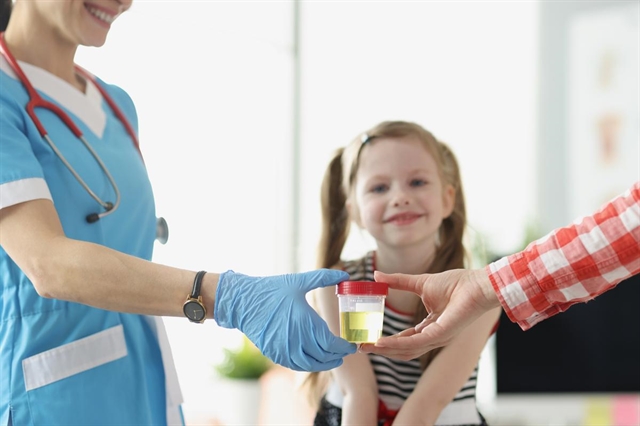 Life & Style
Life & Style


|
| Dr Mattias Larsson. Photo courtesy of Family Medical Practice |
by Dr Mattias Larsson*
Linh, a vibrant and active five-year-old girl, began to notice she had to urinate more frequently. At first, it was mild, but as time went on, she started experiencing increasing discomfort and pain while urinating. Her parents noticed she had a fever up to 39°C and took her to a local clinic where the doctor diagnosed her urinary tract infection (UTI). She was prescribed cotrimoxazole, a common oral antibiotic. Linh's parents followed the prescribed treatment.
However, the treatment did not bring the anticipated symptom relief. Linh's fever persisted and increased to 40°C and she began complaining of pain in her lower back. The antibiotic treatment did not seem to be effective. Alarmed, her parents decided to consult Family Medicine Practice (FMP) for a second opinion and a more comprehensive assessment of Linh's condition.
At FMP, the pediatrician examined her and performed a urine dipstick test that showed high levels of leukocytes and nitrite in Linh's urine, suggesting a urinary tract infection and so a urine culture test was performed. Blood tests including complete blood count (CBC), C-reactive protein (CRP) and creatinine showed that it was a severe infection also affecting the kidneys. There was also a risk for the infection to go into the bloodstream, a possibly lethal situation. Luckily, the ultrasound investigation showed that there was still no damage to the kidneys. It was decided to treat Linh with amikacin, an effective broad-spectrum antibiotic administered through intramuscular (IM) injections or intravenous (IV) once per day, enabling her to be treated as an outpatient and go home in between the daily injections.

|
| Only thorough symptom analysis and adequate testing leads to the right treatment. — Photo shutterstock.com |
The amikacin treatment showed good effect, Linh's fever subsided already after one day of treatment, and the pain diminished, indicating progress in her recovery. The urine culture revealed the presence of ESBL-producing E. coli, an antibiotic-resistant strain of bacteria often causing UTI. It also showed that this strain of e-coli was susceptible to an oral antibiotic so after three days of IM amikacin injections she could start oral treatment with tablets as well as probiotics to support the intestinal microbiota and digestion.
UTI is to a high extent auto-infectious: we infect ourselves with our own stool. It is more common in women and children as they have shorter urethra nearer to the anus. E-coli is an opportunistic bacterium: sometimes it’s our ally, (in Vietnamese Lợi khuẩn), helping us with our digestion, but it can also be an enemy (Vi khuẩn), causing disease if in the wrong place of the body. We have more Lợi khuẩn bacteria in our body than human cells, and reside in our gastrointestinal tract. When we use antibiotics, we kill off a lot of these bacteria, however, some may become resistant to the antibiotics and survive. As there is a lot of unnecessary antibiotic overuse for viral infections we constantly select for antibiotic resistant bacteria, turning the lợi khuẩn in the gut into a pool of antibiotic resistant bacteria, such as ESBL-producing E. coli. These become dangerous when causing infections such as the UTI in Linh. In Việt Nam, we have found that there is a high rate of colonisation with multi resistant superbugs such as ESBL and the more resistant ESBL-carba causing severe infections, especially in hospitalised immunosuppressed patients.
Fortunately, new rapid tests are now becoming available that can detect antibiotic resistance mechanisms as ESBL which enables more timely diagnosis and selection of adequate treatment.
The story of Linh emphasises the importance of recognising the symptoms of UTIs, in small children the only symptom may be fever, in older children also discomfort and pain during urination, the significance of accurate diagnostics through urine testing and culture guiding the selection of appropriate medication. Most importantly the challenges posed by unnecessary antibiotic use and selection of antibiotic resistant “superbugs” with consequently increasing incidence of drug-resistant UTI that are difficult to treat with common oral antibiotics.
How can you avoid UTI? Good toilet hygiene, wipe from the urethra towards anus and most importantly – to avoid risk for infections with superbugs can be difficult to treat - do not self-medicate with antibiotics! When sick go to a health care provider with competence to do differential diagnostics between viral and bacterial infections and for symptoms of UTI also microbiological capacity. Family Medical Practice
*Dr Mattias Larsson is a pediatric doctor at Family Medical Practice and associate professor at Karolinska Institutet and has a long experience in research on infectious diseases. He has worked with the Oxford University Clinical Research Unit and the Ministry of Health of Vietnam. He is fluent in English, Swedish, Vietnamese, German and some Spanish.
Visit Family Medical Practice Hanoi 24/7 at 298I P. Kim Mã, Kim Mã, Ba Đình.
To book an appointment, please call us at (024).3843.0784 or via Whatsapp, Viber or Zalo on +84.944.43.1919 or email hanoi@vietnammedicalpractice.com.
FMP’s downtown location in Hồ Chí Minh is in Diamond Plaza, 34 Đ. Lê Duẩn, Bến Nghé, District 1, Thành phố and 95 Đ. Thảo Điền, district 2. Tel. (028) 3822 7848 or email hcmc@vietnammedicalpractice.com.




